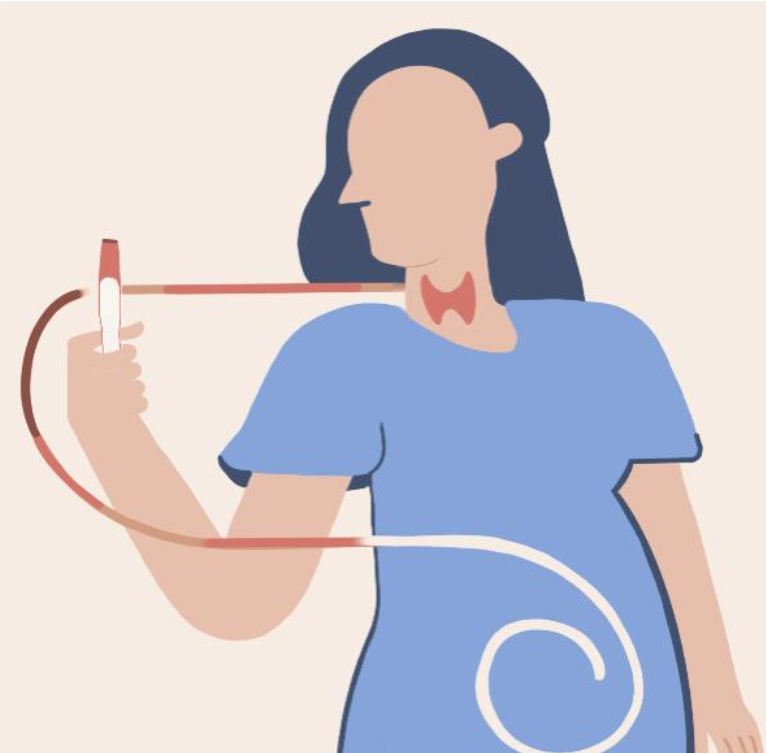While oestrogen and progesterone get all the attention when talking about conception, an under-discussed hormone, that is equally as important, is the thyroid hormone.
The thyroid gland is a small, butterfly-shaped organ in front of the neck that plays a crucial role in the body’s metabolism, which involves generating energy from food. While a lot of people are aware of the effect that thyroid disorders have on body weight and mood disturbances, its effects on the menstrual cycle and fertility are less known.
The function of the thyroid gland is regulated by the hypothalamus-pituitary axis. This axis also controls the production of the hormones related to fertility, and hence, a thyroid dysfunction can affect the function of the reproductive organs. Either an excess or deficit of thyroid hormones can impact fertility in a negative manner. The ability to conceive and the ability to carry a preganancy to term are decreased due to the disturbance in ovulation and implantation, thereby increasing the risk of miscarriage.
A thyroid dysfunction not only impacts a female’s ability to conceive, but also significantly reduces male fertility. The thyroid hormones play a role in the development and function of the testes, and a dysfunction in the thyroid gland can cause decreased semen volume (amount ejaculated), sperm density (sperm count per millilitre of semen), sperm motility (how effectively the sperms move) and sperm morphology (size and shape of the sperm). All these impacts make it harder for the sperm to enter the uterus and reach the egg for fertilization.
In a few cases, even when the thyroid levels are normal, the thyroid antibodies in the body can cause decreased fertility by causing difficulty in fertilization, implantation and increasing the risk of miscarriages. Increasing demands of thyroid hormones from a developing fetus can occasionally cause new-onset or worsening hypothyroidism for pregnant patients. Additionally, impaired thyroid function prior to and during pregnancy can impact healthy development of the fetal brain.
Thus, the thyroid gland plays a very important role especially during the reproductive years. As per various guidelines, screening for thyroid disorders is compulsory for all pregnant women. An early diagnosis of thyroid abnormalities can help avoid neurodevelopmental delay in the fetus by ensuring early correction of the deficiency. According to a few studies, correction of subclinical hypothyroidism can help improve the fertility outcome in a lot of women with unexplained infertility.
How do I suspect if I have a thyroid disorder?
As thyroid hormones are involved in the metabolism process of the body, a decrease in the thyroid hormones manifests in a slowed-down metabolism.
Initially, one may feel tired or sluggish. It can then cause a variety of symptoms, such as:
- Feeling excessively cold, especially when other people do not
- Constipation, that is hard stools
- Weight gain, without an increase in consumption of food
- Mood disorders, such as sadness or depression
- Pale, dry skin
- Dry and thinning hair
- Less sweating than usual
- A puffy face
- A hoarse voice
- Changes in the pattern of bleeding during periods or irregular cycles
An increase in the thyroid hormones, on the other hand, causes:
- Weight loss, even if you eat the same or more food (most but not all people lose weight)
- Eating more than usual
- Rapid or irregular heartbeat or pounding of your heart
- Feeling nervous or anxious
- Feeling irritable
- Trouble sleeping
- Trembling in your hands and fingers
- Increased sweating
- Feeling hot when other people do not
- Muscle weakness
- Diarrhea or more bowel movements than normal
- Fewer and lighter menstrual periods than normal
- Changes in your eyes that can include bulging of the eyes, redness, or irritation
What should I expect at the doctor's visit ?
When you visit a doctor in case you suspect a thyroid disorder, the doctor will first check your vitals, then conduct a quick general and systemic examination to pick any signs that indicate a thyroid disease. Based on the clinical suspicion, the doctor will then order a few tests to find out your thyroid levels. Once the test reports are available, based on the levels, the doctor will prescribe the required medicines in the appropriate dose.
If I already have a thyroid condition, does this mean I can't get pregnant ?
Thyroid disorders are known to affect fertility. Uncorrected disorders in either the male or female partner can decrease the ability to conceive. However, with adequate treatment, if the thyroid levels are normalized, the ability to conceive is at par with a couple having no thyroid disorders. It is important to start medication as soon as diagnosed and continue taking the medications regularly. It is also important to keep a check of your thyroid levels at least once every 6 months.
Some disorders of the thyroid gland may be genetic, which means it can run through families. However, various neonatal screening tests are available which can help diagnose the disorders at birth to ensure the treatment is immediately started.
Bottom Line:
Checking for a thyroid disorder when experiencing multiple symptoms stated above can aid in understanding problems with conception, due to the vital role that these hormones play in the reproductive process. Earlier diagnoses can lead to proper management of the disorder, thus ensuring regulation of the body’s functions.
Disclaimer : This information is provided for educational purposes and should not be construed as medical advice. Please consult with your healthcare practitioners before undertaking any changes in your diet or adding supplements.
ProactiveForHer is a digital clinic for women, offering accessible, personalized, and confidential health-care solutions. We offer products and services for out-patient health concerns of Indian women, across their lifetime - from puberty to pregnancy to menopause. To know more on the sexual and reproductive health of women, visit https://www.proactiveforher.com/

